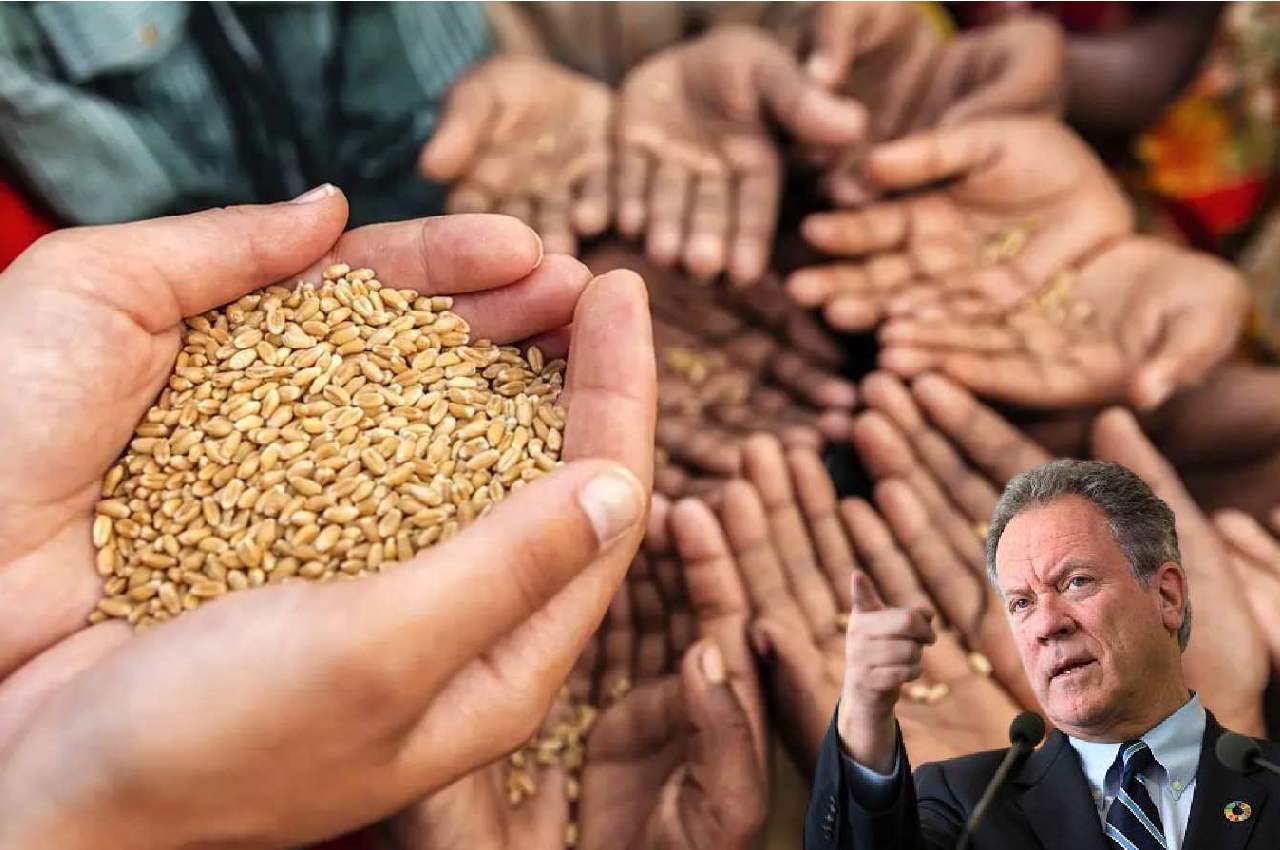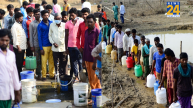New Delhi: The world is in for an upcoming Global Food Crisis. A range of factors have been in play to ascertain that the nations across the world will be witnessing an acute food shortage. And the unprepared nations are going to experience ‘severe consequences’ amounting to diseases, civil wars and ultimately loss of lives.
Ever since Covid-19 hit the world it seems to have taken all the existing systems that help in normal functioning of mankind has been taken by storm. The world was not yet out from the grasp of Covid-19, Moscow decided to launch a “special military operation” in Ukraine with the goal of liberating the Donbass region and de-nazifying Kyiv.
The world leaders are unable to ascertain how they are going to respond and many are planning out various ways. Food and Agriculture Organization (FAO) Director General Qu Dongyu, International Monetary Fund (IMF) Managing Director Kristalina Georgieva, World Bank Group (WBG) President David Malpass, World Food Programme (WFP) Executive Director David Beasley and World Trade Organization (WTO) Director General Ngozi Okonjo-Iweala issued the following joint statement calling for urgent action to address the global food security crisis.
Lives and livelihood of 345 million people in 82 countries at risk: WFP
The COVID-19 pandemic, interruption in international supply chains, and the war in Ukraine have severely disrupted food, fuel, and fertilizer markets, which are interlinked. By June 2022 the number of acute food insecure people – whose access to food in the short term has been restricted to the point that their lives and livelihoods are at risk – increased to 345 million in 82 countries according to WFP. Making matters worse, around 25 countries have reacted to higher food prices by adopting export restrictions affecting over 8 percent of global food trade.
In addition, complicating the food supply response is the doubling of fertilizer prices over the last twelve months, reflecting record-high costs of inputs such as natural gas. Global stocks, which steadily increased over the last decade, need to be released to bring prices down. All this is happening at a time when fiscal space for government action is already severely constrained following the COVID-19 pandemic. Beyond the short term, climate change is structurally affecting agriculture productivity in many countries.
Avoiding further setbacks to achieving the Sustainable Development Goals requires short and long-term actions in four key areas: (i) providing immediate support to the vulnerable, (ii) facilitating trade and international supply of food, (iii) boosting production and (iv) investing in climate-resilient agriculture.
Providing immediate support to the vulnerable
Rapidly strengthening safety nets for vulnerable households at the national level and ensuring that WFP has sufficient resources to serve the neediest is a priority. WFP operations should be facilitated through actions such as the recent agreement by WTO members not to impose export restrictions on its purchases of food for humanitarian purposes. Unless they are well targeted, energy and food subsidies are expensive and inefficient. They should be replaced with cash transfers that reach only the most vulnerable. Over time, effective social protection systems may be expanded to cover more people. The best systems include strong targeting and efficient enrollment, delivery, and payment systems, often leveraging technology.
Facilitating trade and the international supply of food
In the short term, releasing stocks, as appropriate and consistent with WTO rules, and finding a diplomatic solution to evacuate the grains and fertilizers currently blocked in Ukraine, will help address availability and affordability of food supplies. Facilitating trade and improving the functioning and resilience of global markets for food and agriculture, including cereals, fertilizers, and other agriculture production inputs are key, as outlined in the WTO Ministerial Declaration on the Emergency Response to Food Security.
The 2008 crisis taught us that imposing global trade restrictions leads directly to increases in food prices. Removing export restrictions and adopting inspections and licensing processes that are more flexible help minimize supply disruptions and lower prices. Increasing transparency through notifications to the WTO and improving the monitoring of trade measures will be critical.
Boosting production
Taking action to encourage farmers and fishers to boost sustainable food production – in both developing and developed countries – and improve the supply chains that connect them to the world’s eight billion consumers is needed. This requires affordable fertilizers, seeds, and other inputs through the private sector as the primary actor in these markets. Providing working capital for competitive producers is also a key priority.
Looking forward, disseminating best practice knowledge by FAO, WBG, and others will be key to increasing efficient fertilizer use through the rapid deployment of soil maps, extension services and precision agriculture technology. This will provide producers with the necessary know-how crucial for maintaining production levels and promoting sustainable use of natural resources.
Investing in climate-resilient agriculture
Supporting resilient investments in agricultural capacity and providing support to adaptation, smallholder farms, food systems and climate-smart technologies are essential to develop a resilient climate-smart agriculture that will ensure steady production in the years to come. Work on norms and standard-setting for food safety and on value chain infrastructure (storage facilities, cooling facilities, banking infrastructure and insurance infrastructure) is also important to increase access and reduce inequality.
Minimizing social unrest is essential
Previous experience demonstrates that it is important to support developing countries hurt by price increases and shortages to meet their urgent needs without derailing longer-term development goals. Assuring that the most vulnerable countries facing significant balance of payments problems can cover the cost of the increase in their food import bill to minimize any risk of social unrest is essential.
Development financing should provide clients with viable alternatives to inward-looking policies such as export bans or blanket subsidies of fertilizer imports. Investments in scalable safety nets and climate resilient agriculture and sustainable fisheries and aquaculture are good win-win examples.
Solutions: Strengthen safety nets, facilitate trade, boost production, and invest in resilient agriculture
We call for countries to strengthen safety nets, facilitate trade, boost production, and invest in resilient agriculture. Country specific needs should be identified and defined through a country-based process that mobilizes investments from multilateral development banks to connect short-, medium- and long-term opportunities.
And we commit to working together to support this process through the Global Alliance for Food Security, jointly convened by the G7 Presidency and the WBG, to monitor the drivers and the impact of higher prices and help ensure that investment, financing, data, and best-practice knowledge are available to countries in need.
Nations and World Leaders on Global Food Crisis
“Indigenous people can help…” says Jacinda Arden
Prime Minister of New Zealand, Jacinda Ardern, announcing that Wellington would join the Indigenous Peoples’ Food Systems Coalition, said, “We are committed to ensuring Indigenous Peoples can help lead the way forward.”
She further said, “For New Zealand, this means promoting the significant role of Māori in our food sectors and encouraging the growth of Māori agribusiness by removing barriers and empowering Māori leadership.”
Honduras, Samoa, Peru and the Philippines to focus on indigenous people
Nations are now pledging support for the rights of indigenous people. Honduras is focusing on strengthening the role of local authorities. Samoa is on its way to promote traditional and indigenous knowledge to boost nature-positive production. Peru and the Philippines are on the path to establish support for formalization of land tenure.
“We are failing to eradicate hunger…” says Finland President Sauli Niinisto
President of Finland, Sauli Niinisto smashing the world leaders on inability to eradicate hunger said, “We, as the global community, are not delivering on our promises to eradicate hunger.”
He further said, “In Finland, free-of-charge school meals have been provided since the 1940s… to address post-war poverty and malnutrition.”
Adding further he said, “School meal system has proven to be an investment in the future and in the economic and social welfare of the society.”
Bangladesh, Burkina Faso, Cambodia to reassert policy decisions ensuring food safety
Prime Minister of Bangladesh, Sheikh Hasina recognizing food as a “basic fundamental right” highlighted the need to focus on “quality food for everyone” in a country where agriculture remains the most important factor.
West African nation Burkina Faso has also highlighted the right to food. They have committed to providing it a further constitutional blanket cover.
Cambodia pledges to work towards the promotion of gender equality in jobs relating to food system. They want to ensure equal job opportunities for youth and women in the food system. They want to equip people to become ‘agents of change’ for nutritious diets.













